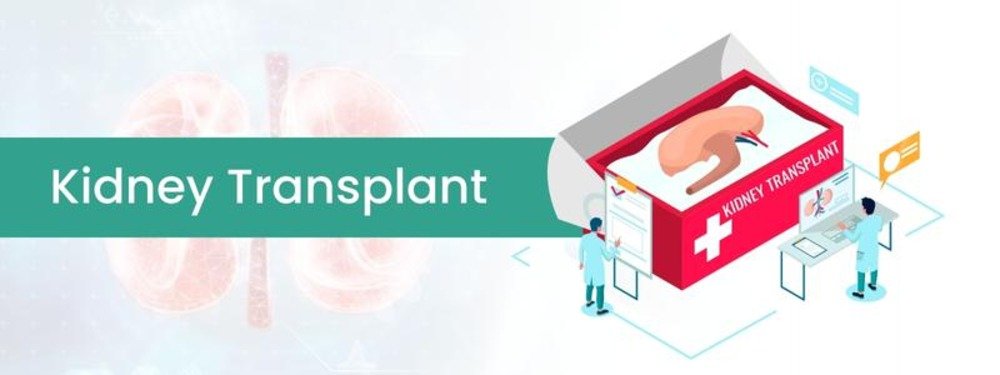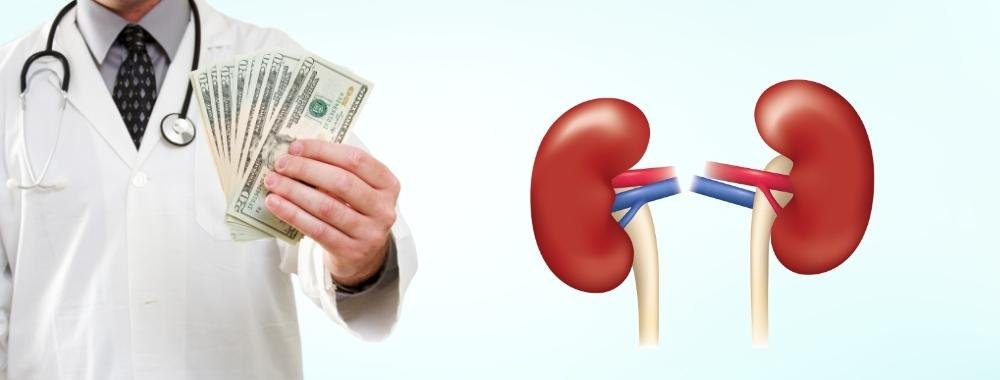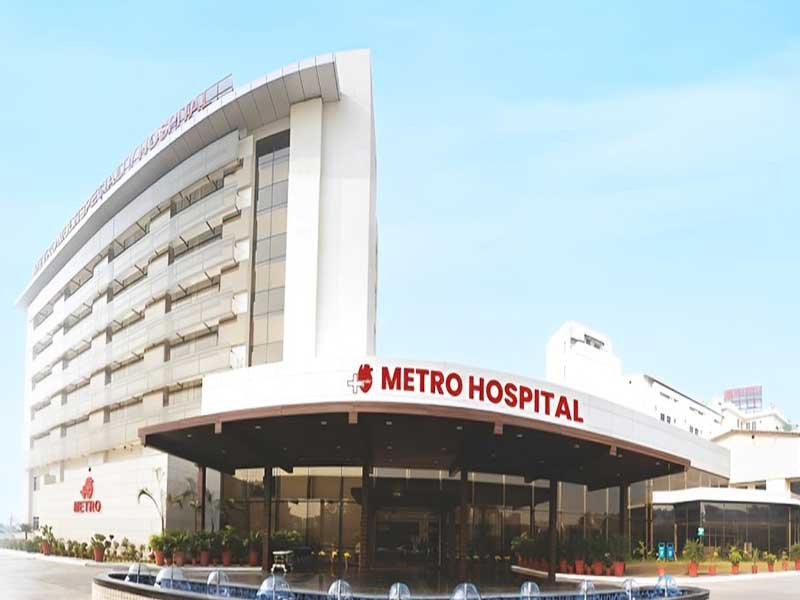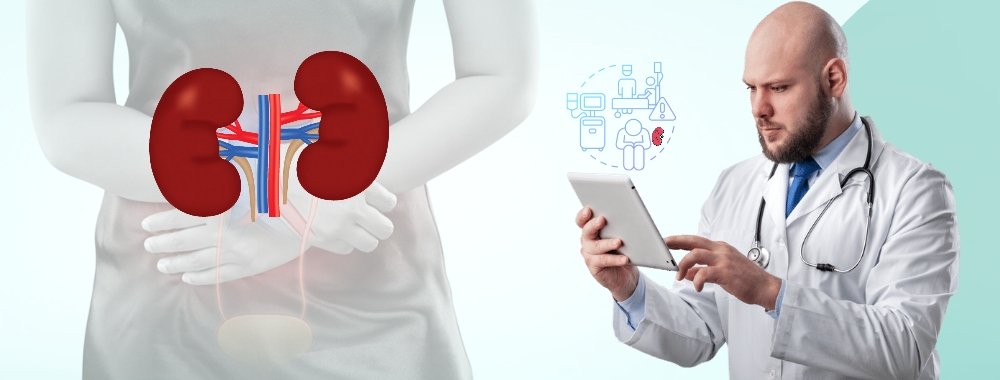Kidney transplant is best choice for international patients due to its affordable cost and quality of care.
Recovery Time
2-3 Weeks
Success Rate
98%
Hospital Stay
7-8 Days
Treatment Type
Surgical
Home Treatments Organ Transplant Kidney Transplant
Are you looking for an affordable option for a kidney transplant?
India offers high-quality kidney transplant surgeries at a fraction of the Kidney Transplant cost in India compared to Western countries.
The country boasts top hospitals, highly skilled doctors, and the latest medical technologies, ensuring excellent success rates.
With its advanced healthcare infrastructure and affordable prices, India has become a top choice for international patients seeking effective kidney transplant solutions.

You might be recommended for a kidney transplant if you have end-stage renal disease (ESRD) or are in later stages of chronic kidney disease, such as Stage 3B, Stage 4, or Stage 5.
Compared to a lifetime on dialysis, a kidney transplant can provide a more effective treatment for chronic kidney disease or ESRD. It offers the chance to feel better, have more freedom, and live a longer, healthier life.
The kidney transplant cost in India is lower than in Western countries, yet it depends on several factors, including:
Cost Component | Details | Estimated Cost in USD |
Pre-operative Consultation & Diagnosis | Consultations, X-rays, MRI scans, blood tests | 1200-1300 USD |
Surgery Costs | Includes surgeon fees, type of surgery, type of implant, and hospital stay | 13000-14500 USD |
Rehabilitation and Follow-up | Physiotherapy sessions, medications, supportive devices, and follow-up visits | Variable by Procedure |

Key Factors That Affect the Kidney Transplants cost in India are:
India | 13000-14500 USD |
United States | 400000 USD |
Germany | 75000 USD |
Turkey | 16000-25000 USD |
◾Key Takeaways
✅ Affordable Treatment Cost: The cost of a kidney transplant in India is significantly lower compared to Western countries. In India, you can receive high-quality treatment at a fraction of the cost without compromising on the quality of care.
✅ Advanced Medical Technologies: Indian hospitals are equipped with the latest technologies, offering minimally invasive approaches and robotic surgeries. These advancements ensure patient safety and faster recovery times for those seeking treatment in India.
Kidney Transplant cost
Treatment Name
Estimated Cost
Kidney Transplant 13000-14500 USD Robotic Kidney Transplant 15500-16000 USD
India is known for providing high-quality care for kidney transplants, thanks to its advanced medical technologies and highly skilled surgeons. Here are some key factors that contribute to the quality of care:
India’s kidney transplant surgeons are highly skilled, with many having international training. They are experienced in using the latest advancements, such as minimally invasive techniques and robotic surgery, to provide high-quality care for patients seeking treatment in India.
Beds: 539
New Delhi
Beds: 230
New Delhi
Beds: 710
New Delhi
Beds: 650
New Delhi
Beds: 191
New Delhi
Beds: 310
New Delhi
Beds: 330
Gurugram
Beds: 380
New Delhi
Beds: 402
New Delhi
Beds: 1300+
Gurugram
Beds: 1000
New Delhi
Beds: 450
Faridabad
Beds: 675
New Delhi
Beds: 500
New Delhi
Beds: 400+
Faridabad

Max Super Speciality Hospital, Saket

Aakash Healthcare Super Speciality Hospital

Indraprastha Apollo Hospital

BLK Max Super Speciality Hospital

Dharamshila Narayana Superspeciality Hospital

Fortis Escorts Heart Institute

Fortis Memorial Research Institute

Manipal Hospital Dwarka

Max Super Speciality Hospital Shalimar Bagh

Medanta - The Medicity Hospital

Moolchand Kharaiti Ram Hospital

Sarvodaya Hospital

Sir Ganga Ram Hospital

Venkateshwar Hospital

Metro Heart Institute with Multispecialty
India’s top hospitals are equipped with highly experienced specialists and the latest technologies, ensuring safe and precise treatment for patients undergoing kidney transplants.

Here is a list of the latest advancements in kidney transplants that have greatly improved the safety and effectiveness of the procedure for patients:
This innovative procedure allows patients to receive a kidney from a living donor, such as a family member or friend, even if they do not share the same blood type. By reducing antibodies and preventing rejection, this life-saving transplant has become possible for more patients.
Fill in your details and we'll get back to you soonGet Free Treatment Quote
In the past, a perfect match between the donor and recipient was crucial for a successful kidney transplant. However, with new techniques, it's now possible to perform a transplant even without an exact match. This approach uses special treatments such as immunosuppressive drugs to reduce the risk of rejection and improve outcomes.
Here are the common tests that will be done on the patient to determine their condition:
Before a kidney transplant, both the donor and recipient must go through several tests to ensure compatibility and health. These include:
Kidney and Liver Tests | These tests check for any infections or issues in the kidney or liver before transplantation:
|
Immune System Tests | These tests help assess the immune system:
|
Lung Tests | These tests check the health of the lungs:
|
Heart Tests | These tests assess heart function:
|
Blood Flow Tests | These tests ensure proper blood flow:
|
Blood Tests |
|
Urine Tests |
|
Radiology Tests |
|
Clearance for Kidney Transplant |
|
Blood Tests |
|
Urine Tests |
|
Radiology Tests |
|
Clearance for Kidney Transplant |
|
🟢 Do’s Before Surgery
✅ Follow Your Doctor’s Instructions: You must follow your doctor's instructions carefully, especially regarding dietary restrictions and medication guidelines.
✅ Take Prescribed Medications: You should continue taking any prescribed medications unless your doctor advises you to stop certain medicines before the surgery.
🔴 Dont's Before Surgery
❌ Don’t Eat or Drink Before Surgery: You will be instructed not to eat or drink anything for 8 to 12 hours before the surgery to ensure the anesthesia is administered safely.
❌ Avoid Smoking and Alcohol: You will be advised to stop smoking and drinking alcohol, as they can negatively affect the recovery process after surgery.
Fill in your details and we'll get back to you soonGet Free Treatment Quote
After a kidney transplant, you will usually stay in the hospital for 3 to 5 days, but this could be longer depending on how quickly you recover.
The time you spend in the hospital also depends on whether your kidney came from a living or deceased donor. Kidneys from living donors start working faster, so patients usually stay for 4 to 6 days. If the kidney is from a deceased donor, the hospital stay may be 6 to 10 days.
The success rate of kidney transplants is around 95% to 98%. However, the results can vary depending on whether the donor is living or deceased. Living donor transplants generally have a slightly higher success rate. Overall, the survival rate after a kidney transplant is very high.

A kidney transplant is a major procedure that can have several possible complications, including:
Why Choose Mejocare for Kidney Transplant in India?
✅ Team of Top Urologists: We recommend you doctors have more than 20 years of experience in Urologist.
✅ JCI/NABH Accredited Hospitals: We have also partnered with hospitals that have State-of-the-art Facilities that are equipped with the latest technologies such as robotics, machine learning, and cutting-edge diagnostic and therapeutic equipment, designed to offer you comprehensive and personalized care.
✅ Other Benefits: Mejocare offers a variety of services, including medical visa invitation letters and guidance through visa procedures and formalities. From airport pickups and drop-offs to hotel bookings and 24/7 patient support, they ensure a seamless experience for international patients. Additionally, we provide hospitalization assistance, local SIM cards, and fit-to-fly certificates for patients ready to travel after treatment.
Kidney transplants can improve the quality of life for people with kidney diseases, and by replacing a failed kidney with a healthy donor, experience better health outcomes. Experienced doctors perform this surgery to replace the kidney from the living or deceased donor to give them a new life. Still, on the other hand, it has complications or risks as well, so before processing for the surgery, consult the doctor.

Medically Reviewed By
QualificationsMBBS, DTMU University, Georgia.Radiation Oncology Resident at Burdwan Medical College and HospitalDr. Aryan Malhotra is a skilled and caring doctor. He is a Radiation Oncology Resident at Burdwan Medical College and Hospital. He treats people with cancer and works closely with patients during their treatment.He completed his MBBS from David Tvildiani Medical University in Georgia. He has passed the USMLE... Read More
Registration Number: 95565
Qualification: MBBS, MD from DTMU University, Georgia, Radiation Oncology Resident at Burdwan Medical College and Hospital
The average cost of Kidney Transplant in India is 13000-14500 USD.
The success rate of Kidney Transplant in India is around 98%.
Pre-transplant package and 5-7 dialysis included. The recipient has to stay for 10 days and Donor has to stay for 6 days.
For 2 to 4 weeks, you won't be allowed to drive or move anything heavier than 10 pounds. If there are no difficulties, you might be able to return to light work in 6 to 8 weeks. You can ask questions about what you can and cannot do while recovering after a kidney transplant from your nurse coordinator.
Sure, after a kidney transplant, serious issues like blood-related problems, ureter complications, infections, rejection, and rare health events such as heart attacks or strokes can occur.
After a kidney transplant in India, doing exercises that make your heart and lungs work harder—like climbing stairs, running, cycling, or playing sports—helps keep them strong. You also need exercises that make your muscles and bones stronger, like walking or lifting light weights. Doing these about three times a week is good for you.
For 2-4 weeks, you won't be allowed to drive or move anything heavier than 10 pounds. If there are no difficulties, you might be able to return to light work in 6 to 8 weeks. You can ask questions about what you can and cannot do while recovering after a kidney transplant from your nurse coordinator.
Yes, it is necessary to have a companion.
Usually 6 months after.
Yes, you can do your own research and choose your therapist.
You can use Paracetamol regularly to manage mild to moderate pain. Moderate pain can be managed using non-steroidal anti-inflammatory drugs (NSAIDs) like diclofenac or ibuprofen.
Yes, insurance will cover the cost of a Kidney Transplant in India.
To discover the top doctors or hospitals in India, you can visit our website, mejocare on the doctors' page, you can filter and find the finest doctors, while on the hospital page, you can identify the best hospitals. Additionally, you can reach out to us, and we will gladly offer you all the necessary suggestions and information you need.
6-12 hours.
No, there is no waiting list for Kidney Transplant in India.
Before surgery, you might need tests like a blood test, urine analysis, chest X-ray, ECG, and kidney function tests to ensure everything is okay before the procedure.
During a kidney transplant in India, doctors typically use propofol, a safe and fast-acting medication that helps you sleep during the procedure without being completely unconscious.
Within 2 months.
Constipation is a common side effect after surgery, often due to medications like opioids. Some foods can help prevent it, while others can make it worse. Avoid high-fat, processed, and sugary foods to manage constipation effectively.
After surgery, monitoring your vital signs is crucial. Take care of your wound as advised and manage any post-operative complications that may arise. Engage in rehabilitation services to aid your recovery and attend follow-up appointments for a smooth healing process.
Our care team can help you.
